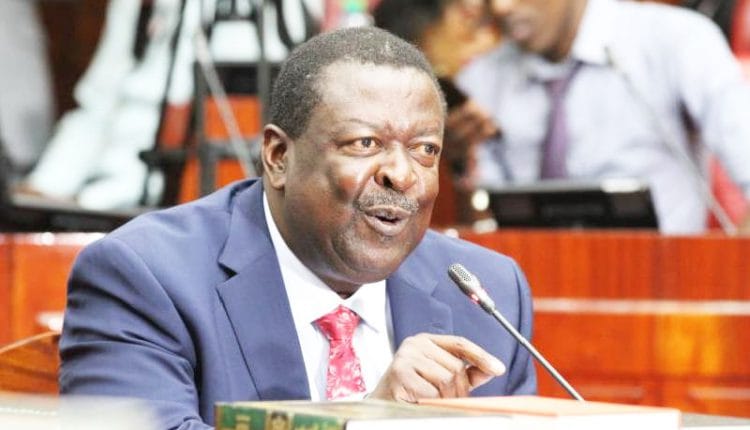Government Moves To Manage Fiscal Risks Amid Harsh Economic Times
To alleviate poverty and the harsh economic times Kenya needs to change tact and create an environment where every person can “fish.” This starts by prioritizing the identification of loopholes that cripple the economy. The development of Kenya’s economy according to economic experts must now focus on improving the ease of doing business, lowering the cost of production, and cutting parastatals reliance on National Treasury for daily operations. Above all, the government must support businesses and create sustainable employment opportunities for a prosperous future as Corporate Watch Magazine’s Swao Mururi writes.
“The harsh economic times will compel the government of Kenya to do away with unprofitable State Corporations,” Prime Cabinet Secretary Musalia Mudavadi recently revealed. The CS warned Kenyans to brace for tougher economic times ahead. The planned shutdowns, are part of austerity measures the Kenya Kwanza government seeks to employ in a bid to turn around the country’s economic fortunes.
Unprofitable parastatals, according to the CS who is an economist, pose high fiscal risks to the government owing to their large debts and the associated repayment risks as well as unsustainable pending bills.
“We as the Kenya Kwanza government will have to decide which State corporations justify their existence. This will be pegged on their performance. Hard decisions are on the way,” he noted.
Over the years, the financial performance and operational efficiency of many State Corporations have been dwindling, weighing heavily on public finances by increasingly relying on budgetary support from the National Treasury.
In the recent past, just a handful of the over 250 state corporations have been profitable. Kenya Ports Authority (KPA), Kenya Pipeline Company Ltd, Kenya Airports Authority and the Kenya Electricity Generating Company are listed as among parastatals that justify their existence.
Non-Profit Making Enterprises…
Even though state corporations are not expected to be listed as profit-making enterprises, they are expected to have a surplus at the end of the financial year. Moreover, they should not be totally reliant on government funding for their operations.
A report by the National Treasury showed that over half of the parastatals in Kenya today run into losses or deficits. ‘Recording a profit for a State corporation is seen as a sign of efficient utilization of public funds. The government therefore after consultations will sell State-Owned Enterprises which have become a burden to the taxpayer as we have regrettably not been doing well in the restructuring of public enterprises,” the Prime Cabinet Secretary stated.
Pundits have however indicated that such a move will further see the government grapple with unemployment which is already on an upward trajectory record high.
Already, the government has been criticized for shutting down companies that have collapsed due to the ‘challenging’ business environment.
In a Gazette Notice issued on January 31st 2023, by the registrar of companies Joyce Koech, the government shut down 67 private and public limited companies contrary to its pre-election pledge of resuscitating collapsed firms. “Pursuant to Section 897 (4) of the Companies Act, it is notified for the general information of the public that the following companies are dissolved,” Koech noted.
The companies shut down included Advanced Industrial Automation Limited, Anime Creations Limited, Badr Residences Limited, Black Diamond Logistics Limited, Blackgold Enterprises Limited, Caresha Healthcare Solutions Limited and Chitrali Spares and Safety Limited.
The registrar also explained that the shutdown companies’ legal attributions will no longer be listed in government records like the rest of the businesses.
Others on the list were Valentine and Company Limited, Dagascrap Limited, Davgat Limited, Environmental Energy Enterprises Limited and House of Decker Limited, among others.
Taming Government-Government Duels…
President William Ruto’s efforts to tackle the country’s debt burden, rising cost of living, and their impacts have taken a new twist as he moves to resolve the root causes of the calamity.
The government, through a presidential order is now taking steps to reverse the mounting court awards against it, which have skyrocketed to Sh150 billion. The Treasury is facing difficulties in settling these court awards, as payment of debts and salaries for civil servants consume a large portion of taxes
Unlawful decisions by government officers have become a major liability, with court awards now a key driver of pending bills for the national and county governments. The Budget and Appropriation Committee of the National Assembly estimated potential compensation for ongoing litigation at Sh1.2 trillion, up from Sh809 billion in 2019.
The Attorney-General, Justin Muturi, is considering recommending new laws that would hold “reckless” government accounting officers responsible for the costs of unlawful decisions.
A recent analysis of budget reports shows that penalties against ministries and state-owned firms are estimated to be Sh108.32 billion, but Mr. Muturi believes the amount is actually in excess of Sh150 billion.
Despite the Office of the Attorney-General advising principal secretaries and chief executives to carefully vet contracts before signing in 2020, the bills have continued to mount. The fines are a result of the determination of historical legal disputes by courts and international adjudicators, some of which have been active for over two decades.
The government’s chief legal advisor has acknowledged the issue and is working on a plan to deal with the mounting bills, but has not disclosed details of the strategy.
Attorney General Muturi’s plan mirrors the proposal that state officers making unlawful decisions be penalized to reduce the burden on taxpayers.
Employment opportunities…

Kenya’s population is in dire need of employment opportunities. To tap into this potential, the country must take advantage of trade agreements, such as the African Continental Free Trade Area (AfCFTA), to establish assembly plants for products in demand across Africa.
India’s success in becoming the world’s fifth-largest economy by requiring companies to set up in their country to reach their market offers a model for Kenya to follow.
However, it is important to note that a stable, predictable political and regulatory environment is crucial for attracting investment and business. To truly address and solve Kenya’s economic struggles, the focus must be on the root causes and creating a productive and prosperous economy.
The concept of a bottom-up economic model has gained popularity as a solution to global poverty and income inequality. The current economic climate demands a rethink of this model and its implementation in order to truly achieve financial stability and prosperity for all.
Foreign Exchange Reserves…
Meanwhile, foreign investors are fleeing away from the Nairobi Securities Exchange due to the biting dollar shortage that has continued to hit the economy.
The Capital Markets Authority (CMA) reported that foreign traders have expressed concerns about the inability to invest in Nairobi Securities Exchange (NSE) products or repatriate returns due to the forex shortage.
Kenya has been grappling with the repayment of external debts like the SGR and Eurobond that are due in March. This has led to a shortage of foreign exchange reserves.
The Capital Markets regulator said this is a major setback for the new Kenyan government’s efforts to attract foreign investment into the country. Foreign investors have traditionally dominated trade on the NSE, providing a large demand for blue-chip stocks.
However, with reduced activity by foreign investors, capital inflow, as well as fees and commissions charged by stockbrokers and the bourse operator, will be negatively impacted.
“Liquidity in Kenya’s interbank forex market has dried up and shifted to the bank-client market where forex transactions are executed at a more depreciated rate, “said IMF in a recent communication.
In the three months to December 2022, the NSE market recorded a further foreign equity net outflow of 4.87 billion Kenyan shillings, compared to the net outflow of 6.97 billion a year earlier.
The lack of foreign exchange is not only deterring foreign investors from investing in Kenya but also exacerbating the impact of emerging exogenous shocks, which affect the attractiveness of the domestic capital markets.
Despite Kenya’s relatively developed capital markets, 75% of all business financing in the country is still provided by the banking sector, with the rest coming from the capital markets.



